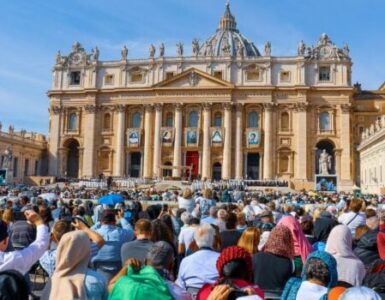There is an essential relationship between a life of simplicity to gain a life of virtue. A life that strives towards simplicity is one that is free to find God in His goodness. It was St. Augustine who said, “Order your soul. Reduce your wants”. As Christians, we understand the necessity to detach ourselves from the inordinate loves of this world and to focus upon God’s love. Yet, modern society has created an environment that constantly seeks to pull the soul towards worldly attractions – temptations void of God’s beauty.
Over the past hundred years, the modern world has been on the cutting edge of industrialization, technology advances, and methods of profiting from consumerism. This materialistic environment did not occur overnight. In fact, we are living in a time that has accrued decades upon decades of productivity. Given the current climate of materialism, have we reached a climax that shows signs of descent? Has society reached a point in which even worldly souls are restraining themselves from purchasing the latest technology, the latest fashions, and have turned away from the constant marketing advertisements that encourage more consumerism? To a degree, there has been a rebellion against materialism with the encouragement of capsule wardrobes, simple living, sustainability, and embracing traditions of past generations. As these detachments are good and can bring souls closer to God, have such movements only pushed society farther away from God’s beauty with the notion of ‘minimalism’?
In a world that is devoid of virtue and beauty there continues to be a search. It is innate that every soul experiences, as it longs for God, and can only be found fulfilled with His love. Modern society has removed the search for God and has motivated wandering souls to search for their own personal desires. And where there is a lack of Divine Love there is also a lack of beauty.
How has this lack of beauty and love manifested itself in society? It has been a slow process as personal desires based on emotion become stronger, lack of reason encompasses decision-making, and virtues are no longer interwoven with life. And what has resulted from this transformation? Minimalism. A movement that embraces simplicity without purpose. A movement that is formed for those searching towards an inner self-love rather than a Divine Love. Ultimately, a mission that is devoid of God, His mercy, His justice, and His love.
What is minimalism and how has it impacted society as a whole? Minimalism has been encouraged by a reigning group of individuals who do not promote the growth of the soul and spiritual life, but instead, where a lifestyle of simplicity without virtue is encouraged. Please do not misunderstand me – there is great beauty in simplicity. It was the earmark of Christian virtue for centuries. Even some of the saintly kings and queens had a simple aura about them, like Saint Elizabeth of Hungary, Saint Margaret of Scotland, and Saint King Louis IX. Their stately positions offered them earthly pleasures, yet, as they lived in holiness, simplicity, and beauty because they lived for God’s glory.
The concept of beauty in the modern world has been distorted. Very few women are referred to as “beautiful” anymore. Is this a result of a society lacking in virtue? Is this the result of men no longer respecting femininity? Or is this a result of feminism pushing its own form of “beauty” for decades? Whatever the case may be, there is a lack in virtuous beauty. A soul that is not in search of virtue and holiness will not exhibit true beauty. As many women find their feminine traits as barriers, rather than beneficial, society has slowly begun to move away from beauty in several areas. As a result, the decrease in beauty has led to a movement of minimalism. There is no longer a desire to embrace beauty and simplicity in parallel as so many saints have done in the past.
Minimalism has become a movement void of beauty to remove the “extras” – whether that be an intricately styled gold frame replaced with black lines to embody a painting or the architecture of a building to resemble a solid shape rather than the original interwoven designs of the Gothic era. The detailed architecture curtailing over the course of history has left the once carefully crafted designs in the dust for the history books. As so much of society desires to forget the past, so too they ignore beauty along with tradition. Rather than preserve the beauty of old architecture, every excuse is found to tear it down and rebuild with a modern style. And what is this style that has been pervading our society for over 60 decades? It is a modern abhorrence of beauty, devoid of virtuous simplicity but invigorated through minimalistic lines.
The colors, given to us by God through nature, no longer pervade our architectural landscape. Blues have been muted to greys and shades of natural wood have been painted in white. The overall color wheel has left the mind with little to the imagination. Yet, God has not withheld the beauty from us as His creation of nature still abounds. With the push of minimalism on one side there is also a movement towards beauty on the other side. It is a movement within modern Christendom that aims to restore traditions. It is through the Romanesque arches, the Gothic cathedrals, the Baroque paintings, and the Renaissance sculptures that we can connect with generations past. These brilliant people, who acknowledged God’s beauty, portrayed it through architecture, paintings, books, and music and share it with others. G. K. Chesteron wisely said, “Tradition means giving votes to the most obscure of all classes, our ancestors. It is the democracy of the dead. Tradition refuses to submit to the small and arrogant oligarchy of those who merely happen to be walking about.”
Through the minimalism in this modern world, God has not deprived us of His beauty. It can be found each time we walk through a forest, boat across a lake, or care for a garden. So, rather than pervade our culture with minimal color, character, and design, let’s return to an age of traditionalism rather than minimalism, where we ultimately will be preserving a Christian culture or future generations.
Photo by Sarah Dorweiler on Unsplash










